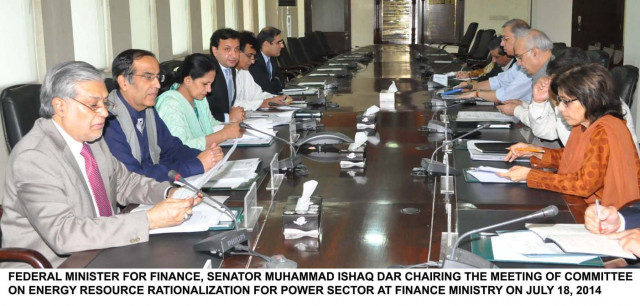Power sector receivables: Ministry asked to devise recovery mechanism
Dar directs water and power ministry to unplug connections of defaulters.

As the power sector receivables mount to Rs520 billion, the federal government has failed to take a decision on how to recover the amount, despite calling a meeting of stakeholders.
A meeting of a committee on energy resource rationalisation for the power sector – held on Friday – remained inconclusive after the chairman of the body, Finance Minister Ishaq Dar, threw the responsibility of devising a mechanism to recover the receivables back on water and power ministry.
The meeting was informed that the total receivables of the power sector have gone up to over Rs520 billion, including the current receivables from the private sector that have been estimated in the range of Rs150 billion to Rs200 billion, said officials who attended the meeting.

Despite defaulting on their bills, these people were still receiving uninterrupted power supply, said the officials. The total receivables from the private sector were estimated at over Rs300 billion. The head of the committee asked the water and power ministry to devise a mechanism to recover the amount from these people or at least disrupt their connections in the first phase.
A similar attempt had been made by the last Pakistan Peoples Party (PPP) government when it decided to unplug the connections of those who defaulted on their bills. It had referred the matter to the National Accountability Bureau (NAB).
The public sector outstanding dues have reached to Rs220 billion. To recover this amount, the Council of Common Interests(CCI) has already allowed reactivating the office of federal adjuster. The adjuster would deduct a portion of electricity dues from the share of federal provinces in federal taxes.
Dar reiterated his stance that the outstanding receivables was the responsibility of the water and power ministry, according to a finance ministry handout issued on Saturday. Dar also said that the water and power ministry should adopt measures to stop system pilferages.
Cost of power production
The committee underscored the need to add every component into cost of power production while determining power tariffs aimed at lessening the finance ministry’s obligations. Dar said if there was any component which was not included in the cost then it was the responsibility of the water and power ministry and the National Electric Power Regulatory Authority (Nepra).

Currently, the line losses were higher than allowed by the power sector regulator, which is one of the main reasons for piling up circular debt.
After coming into power, Pakistan Muslim League-Nawaz (PML-N) government had adopted an easy way by increasing power tariffs. It left the issues of improving governance and reducing line losses unaddressed, said finance ministry officials.
They added these outstanding issues were becoming major causes for non-resolution of the circular debt. The finance ministry also wanted that Balochistan tube well subsidies should also be part of power production, said the officials.
The finance minister directed water and power secretary to establish and quantify the factors which are not accounted to in determining the cost of production. “The estimates should be credible and Nepra should be taken on board while calculating the real cost of production” said the minister.
Khaqan Najeeb, director general of the finance ministry’s economic reforms unit, has been asked to give a presentation on factors that have not been included in cost of power production while determining the tariffs.
Dar directed the water and power secretary to give a detailed briefing on the actual collection figures in the first week of August for the purposes of future strategy to improve recovery of outstanding dues.
Special Assistant to the Prime Minister Dr Musadik Malik urged to mark feeders which are prone to theft. On his recommendation, it was decided by the committee that 8,900 feeders will be marked and Discos will be given clear targets for curtailing losses and improving recovery.
Published in The Express Tribune, July 20th, 2014.


















COMMENTS
Comments are moderated and generally will be posted if they are on-topic and not abusive.
For more information, please see our Comments FAQ